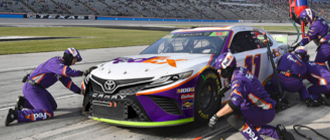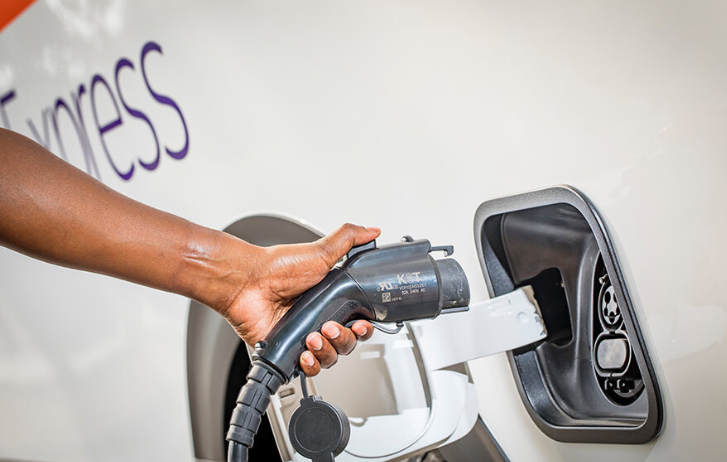
The Unseen Logistics Of Major Sporting Events
By FedEx | First published: March 18, 2022 Updated: March 20, 2024
Mega international sporting events take immense logistical effort to plan and deliver. But for sports fans all over the world, the pay-off is worth it.
Across the globe, sporting events are big business, driving tourism, creating new infrastructure, and providing a boost to local economies playing host to big tournaments. Major events such as the FIFA World Cup, Olympics and Formula 1 attract legions of traveling fans and are worth billions of dollars in sponsorships, brand partnerships and merchandising revenue. These global competitions tend to reignite worldwide passion for sports events as well as local enthusiasm as nations cheer on hopefuls.
To pull off a mega international sports event, logistics services are indispensable. In the last 37 years, FedEx has supported a host of international sports events – from the NFL and PGA tour to the UEFA Champion’s League and ATP tennis. We know just how important the efficiency and reliability of such high-value shipments are to an event’s success. Just like the athleticism that dazzles spectators in elite athletic competitions, logistics companies need to pursue faster speeds, greater flexibility, and more innovative technologies.
Reliable transport networks build a foundation
Just think – the Olympics opening ceremony alone is an event that requires immense logistical planning. Then there’s the weeks-long event itself. International sporting events require the distribution of staggeringly huge quantities of multiple materials across the globe - usually in a short time frame.
These can seriously stretch logistics networks and capacities with countless courier points, wide delivery coverage, vast quantities of materials, and complex scenarios.
Extremely stable and extensive transportation networks plus substantial shipping capacities are key. It’s the job of logistics companies to keep things moving – literally - and respond swiftly to demand for efficient dispatch and distribution of shipments around the world.
Supply chain innovation ensures efficient logistics
Efficiency is a key qualifier of logistics services for mega international sports events — everything from preparation and execution to centralized material recycling after the event.
Coordinating logistics within a tight time frame and collecting packages from multiple locations can be challenging. Important materials for such event operations must be delivered on time, and complex and varied cargo transport rules and customs clearance policies between countries and regions must be followed.
Sometimes, operations have to be timed to the second. Whether we’re delivering the Vince Lombardi Trophy to the Superbowl or the UEFA Europa League cup to the Finals on match night, every minute counts.
To meet those challenges and help us deliver on time, data and innovation are critical. A more extensive use of digital technology can optimize supply-chain efficiency and ensure flexible and efficient event logistics.
By collaborating with third-party technical experts, we’ve launched several logistics solutions that leverage big data, artificial intelligence and other emerging technologies to accelerate supply-chain flexibility and visibility.
Green logistics is a key player in sustainable sporting events
With a pressing need to think about sustainability, event organizers are looking for ways to make their sporting events more environmentally friendly.
But the distribution of materials, venue construction and related personnel activities mean huge demand for material transportation - meaning major challenges in achieving a more sustainable event. Innovations in the logistics industry can help these international events advance down the carbon-neutral track.
Think vehicle electrification, sustainable energy, and carbon sequestration. With the adoption of each new approach, the industry can help reduce emissions and provide sustainable logistics support.
At FedEx, we’ve designated more than US $2 billion of initial investment in three key areas: vehicle electrification, sustainable energy and carbon sequestration.
Across Asia Pacific, Middle East and Africa, we’ve launched electric vehicles in eight countries: Malaysia, Taiwan, Thailand, China, Japan, India, South Africa and the UAE. Besides key initiatives like paperless shipping, creating more sustainable facilities and sustainable packaging solutions, we also work with NGOs to give back to local communities through eco-restoration projects.
Delivering our passion for sport
In almost four decades of working with the sports industry, we have witnessed international sports grow in variety, scale, and influence. Meanwhile, we also face a more complex and robust demand for material distribution. Mega international sports events are not only grand occasions for global sports fans, but opportunities for economic and cultural exchange among countries.
By leveraging our rich logistics experience and evolving service capabilities, we will continue to provide businesses and event organizers of all sizes with stable, efficient and sustainable cross-border logistics services. At the same time, we’re working to improve global economic, trade and cultural connectivity to deliver the best customer experience possible.
To discover more about how we’re helping to deliver some of sport’s most defining moments, head here.
SHARE THIS STORY
- How To Ship A Giant Panda
- How To Make Freight Shipments Work For Your Small Business
- The Rise Of Intra-Asia Trade: Opportunities In The China-Southeast Asia Corridor
- Southeast Asia's Role In Global Manufacturing Supply Chains
- 8 Most Unusual Shipments In The History Of FedEx
- Where Do Old Planes Go When They Retire?
Sign up now and save on your shipping rates!
Sign up now and earn discounts by shipping instantly with FedEx Ship ManagerTM at fedex.com.
Recommended For You

How New Logistics Trends Shape The Future Of Commerce
The world of commerce is constantly evolving. We explore global trends that businesses should look out for to stay ahead of the competition.
Read More
How To Take Advantage Of The Digitization Of Logistics
Keeping up with consumer demands in an increasingly digital world is a challenge for e-commerce businesses. We share tips to help win new customers.
Read More
The 5G Logistics Revolution
Possibilities of 5G are game-changing. Companies should start integrating advanced technology to future-proof their business and remain competitive.
Read More


